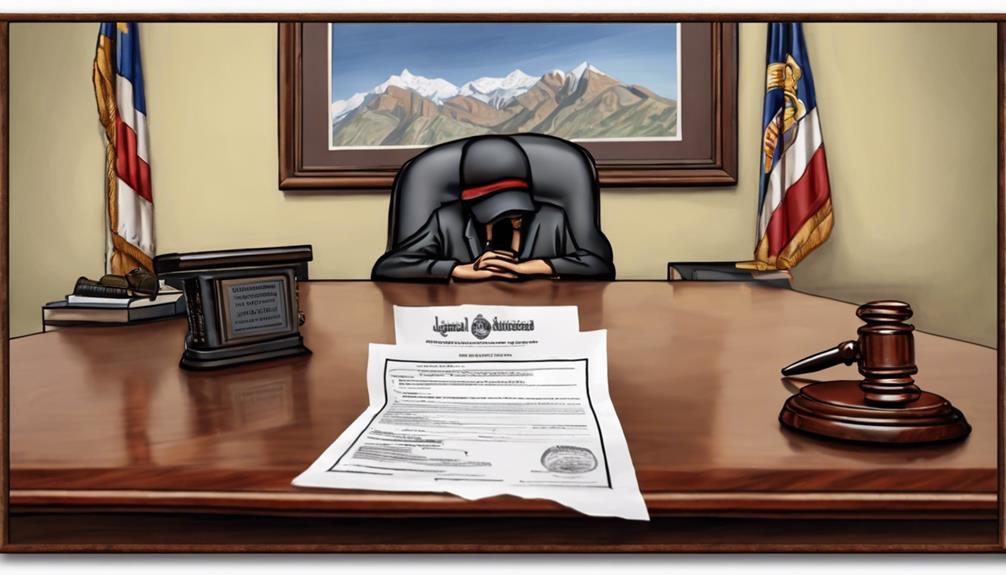To avoid common divorce mistakes, start by communicating openly and honestly to prevent misunderstandings. Be transparent about your finances and avoid rushing decisions without proper legal advice. Focus on key issues like your children’s well-being and trust rebuilding. Don’t ignore warning signs or let conflicts escalate. Staying informed and prepared can save you time, money, and emotional stress. Stay with us to discover more ways to navigate your divorce successfully.
Key Takeaways
- Communicate openly early to prevent misunderstandings and unresolved issues from escalating.
- Address financial disagreements transparently and plan for long-term financial stability.
- Clarify key priorities, including children’s wellbeing and asset division, to avoid confusion and disputes.
- Proactively manage trust and intimacy concerns to reduce the risk of irreparable damage.
- Prepare thoroughly with legal counsel and documentation to ensure fair outcomes and avoid costly mistakes.

Are you aware of the common pitfalls that can make divorce more complicated and stressful? Many people overlook critical issues during this challenging time, which can lead to unnecessary conflict, financial hardship, or emotional regret. Recognizing these common mistakes allows you to navigate the process more smoothly and protect your interests.
One of the biggest errors is poor communication. As tensions rise, especially if you notice your partner is becoming more distant or irritable, conversations tend to deteriorate. When communication quality worsens over time, unresolved issues build up, increasing the likelihood of divorce. Unrealistic expectations and difficulty making decisions can escalate problems, making it essential to address concerns early. Ignoring early signs like financial disagreements or lack of quality time can set the stage for more significant conflicts later. If you don’t tackle these problems promptly, they tend to snowball, complicating negotiations and prolonging emotional distress.
Financial disagreements are another common mistake. Money problems, especially in second marriages where obligations like child support come into play, can cause significant strain. Mismanagement or failure to prioritize financial realities early on can lead to prolonged disputes during divorce proceedings. If you ignore the importance of transparent financial discussions, you risk complicating asset division and settlement negotiations. Furthermore, divorce often results in a substantial income drop, particularly for women, impacting their financial stability long after the divorce is finalized. Failing to plan for this reality can leave you unprepared for the financial aftermath.
Another critical mistake is neglecting to prioritize key issues during divorce. When you don’t clarify your main concerns, conflicts tend to escalate. For example, neglecting your children’s wellbeing or confusing wants with needs during asset division can prolong disputes and increase emotional pain. Without realistic assessments of your finances and priorities, you may make decisions that cause hardship afterward. Early clarity about what truly matters helps streamline negotiations, reduce hostility, and foster better outcomes.
Trust and intimacy problems also frequently lead to divorce. Infidelity, sexual dissatisfaction, or perceived third-party interference are strong predictors of relationship breakdown. If you ignore trust issues or fail to address intimacy concerns early, they often become irreparable, sealing the relationship’s fate. Addressing these problems head-on and seeking help when needed can prevent damage that’s difficult to mend later.
Lastly, rushing into divorce without proper legal preparation is a critical mistake. Improper digital communication, dishonesty with your attorney, or underestimating custody complexities can all prolong proceedings and result in unfavorable outcomes. Making hasty decisions without thorough research increases the chance of costly mistakes and regret. Being well-informed and deliberate throughout the process can save you time, money, and emotional suffering. Recognizing these common pitfalls and actively working to avoid them sets you on a better path toward a fair, less stressful divorce.
Frequently Asked Questions
How Can I Protect My Children’s Interests During Divorce?
To safeguard your children’s interests during divorce, prioritize their emotional well-being by maintaining open communication and providing stability. Seek legal guidance to ensure custody arrangements serve their best interests, and consider mediation to reduce conflict. Focus on creating consistent routines across households, and involve professionals like counselors if needed. Your active involvement and respectful cooperation with your ex-partner help foster a secure environment, ensuring your children feel supported and loved throughout the process.
What Are the Hidden Costs Involved in Divorce Proceedings?
You’ll face hidden costs like legal and professional fees, which can skyrocket in complex cases, especially with high-net-worth assets. Expect expenses for housing changes, including deposits, appraisals, and refinancing. Don’t forget ongoing costs like alimony, child support, therapy, and potential lost income. Unanticipated expenses such as transfer taxes, rising interest rates, and emotional support add up quickly. Planning ahead helps you avoid surprises and manage your finances during this challenging time.
How Do I Choose the Right Divorce Lawyer for My Case?
To choose the right divorce lawyer, start by finding someone who specializes in family law and has local experience. Make sure they’re licensed in your state and have handled cases similar to yours. Schedule consultations to see if you feel comfortable and aligned with their approach. Ask about their fees, review their credentials, and check client reviews. Trust your instincts and pick someone who communicates well and understands your goals.
Can I Settle Divorce Disputes Without Going to Court?
Yes, you can settle divorce disputes without going to court by using out-of-court methods like mediation or negotiation. These approaches let you and your spouse work out terms amicably, often with the help of a neutral mediator, avoiding lengthy and costly court battles. With or without lawyers, settling outside court saves time, reduces stress, and allows for more customized agreements that better suit your family’s needs.
What Are the Long-Term Financial Impacts of Divorce?
Imagine you’re flipping through a newspaper in the 1950s—divorce’s long-term financial impacts are still relevant today. You’ll likely see your household income drop by up to 40%, and your standard of living could fall by nearly half, especially for women. Your retirement savings diminish, ongoing costs rise, and your wealth may plummet by around 50%. These financial setbacks can persist for years, making it tough to rebuild your financial security.
Conclusion
Avoiding these common divorce mistakes is like steering clear of rocky waters; it keeps your journey smoother and your ship steady. Think of your divorce process as a delicate dance—you want to lead with clarity and avoid stepping on toes. By staying informed and mindful, you can navigate these choppy seas with confidence. Remember, every wise choice is a lighthouse guiding you toward a brighter, calmer horizon. Your future peace depends on the steps you take today.










